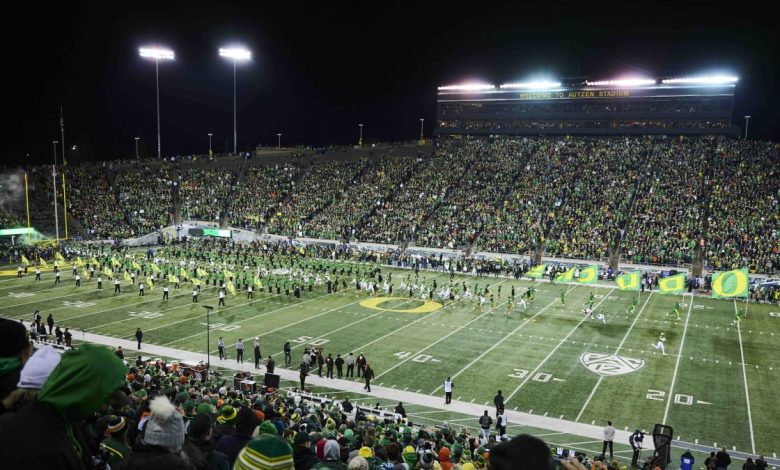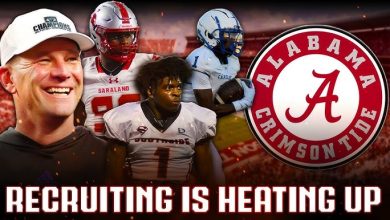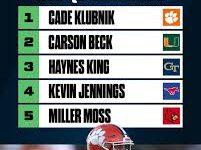Oregon Ducks’ Autzen Stadium surprisingly snubbed from toughest college football stadiums to play, raising questions among fans and experts.

College football stadiums are iconic venues where history, tradition, and fan passion combine to create some of the most intimidating environments in sports. From the deafening roars of the crowd to hostile visitor conditions, these stadiums often give home teams a decisive edge. Among the revered college football venues, Oregon’s Autzen Stadium has long been considered one of the toughest places to play. However, recent rankings and discussions have surprisingly snubbed Autzen, leaving many fans and analysts questioning whether the Ducks’ home field truly gets the respect it deserves.
The Reputation of Autzen Stadium
Opened in 1967 and located in Eugene, Oregon, Autzen Stadium is home to the Oregon Ducks football team. While not one of the largest stadiums — seating approximately 54,000 — it compensates with an atmosphere many describe as electric and relentless.
What makes Autzen truly formidable is the combination of passionate fans packed closely around the field, the acoustics of the stadium which trap and amplify crowd noise, and the fervor of a fanbase that regularly shakes the stadium to its foundations. Opposing teams often find it challenging to communicate on the field, with the stadium’s noise sometimes exceeding 115 decibels, rivaling the loudness of an NFL stadium.
Many former players and coaches alike have publicly spoken about Autzen’s intimidating environment. ESPN analyst Lee Corso famously described it as “the loudest stadium I’ve ever been in my entire life.” This reputation alone has cemented Autzen’s place among college football’s more daunting venues.
The Recent Snub in Toughest Stadium Rankings
Despite the historical reputation and fan testimonials, recent rankings such as those by EA Sports College Football 25 and various sports media outlets have notably excluded Autzen Stadium from their top 10 lists of toughest places to play.
For example, EA Sports placed Autzen at number 11, just outside the coveted top 10. Other tough stadiums that made the cut included Alabama’s Bryant-Denny Stadium, LSU’s Tiger Stadium, Texas A&M’s Kyle Field, and Michigan Stadium. The absence of Autzen from the top 10 has sparked debate in college football circles, with many fans and analysts questioning the criteria used for these rankings.
Criteria for Ranking the Toughest Stadiums
Rankings of toughest stadiums to play in college football typically consider factors such as:
- Crowd Size: Larger stadiums with over 80,000 or 100,000 fans often dominate these lists due to sheer volume.
- Noise Levels: The ability of fans to disrupt opposing offenses with loud noise and create communication problems.
- Home Team Performance: Teams with strong home records or dominant performances on their home turf tend to elevate their stadium’s reputation.
- Tradition and Atmosphere: The history, fan culture, and game day rituals that make a stadium unique.
- Physical Environment: Weather, altitude, and field conditions that add to the difficulty of playing.
In many cases, stadiums like LSU’s Tiger Stadium and Texas A&M’s Kyle Field score high across all these metrics, which can overshadow smaller but still fiercely hostile venues like Autzen.
Why Autzen Stadium Deserves More Respect
1. Intense Crowd Noise
While it may not hold the largest crowds, Autzen’s design amplifies noise in a way that rivals much larger stadiums. The close seating bowl traps sound, making it nearly impossible for visiting teams to communicate. Several studies and fan recordings confirm that crowd noise at Autzen can regularly top 110-115 decibels — similar to a rock concert.
2. Hostile Environment for Opponents
Visiting teams frequently comment on how loud and intense Autzen is, with some suggesting it negatively affects their concentration and execution. The Ducks’ fans are known for their creative chants, timely noise bursts, and continuous support that never wanes.
3. Passionate and Loyal Fanbase
The Oregon Ducks boast one of the most dedicated fanbases in the Pac-12 and nationally. Autzen is often packed, with near sell-out crowds for nearly every home game, reflecting the community’s passion and commitment.
4. Consistent Home Field Success
Historically, the Ducks have enjoyed strong home winning percentages, using Autzen as a fortress. This success has only increased in the modern era, with Autzen often cited as a factor in the team’s ability to upset higher-ranked opponents.
The Factors Behind the Snub
1. Smaller Capacity
The most obvious metric hurting Autzen’s standing is its capacity. At about 54,000 seats, it is significantly smaller than the “giants” like Michigan Stadium (over 107,000), Ohio State’s “The Shoe” (over 100,000), or Penn State’s Beaver Stadium (over 106,000).
Many rankings prioritize crowd size as a proxy for intimidation, which inherently disadvantages smaller stadiums.
2. Lack of National Championships
While Oregon has been a strong program in recent years, making appearances in the College Football Playoff and Rose Bowl games, they have yet to win a national championship. In contrast, stadiums of programs with multiple national titles often receive more reverence.
3. Geographic and Conference Bias
There may be unconscious bias toward stadiums in power conferences with longer, deeper football histories like the SEC and Big Ten. The Pac-12, despite its rich tradition, sometimes gets overlooked.
What Fans and Analysts Are Saying
Fan Reactions
The Oregon fanbase has been vocal in expressing disappointment and frustration over Autzen’s placement outside the top 10. Many fans argue that the stadium’s atmosphere and fan noise should easily place it among the elite venues.
On social media, phrases like “Autzen is louder than most stadiums double its size” and “EA Sports clearly doesn’t understand what playing at Autzen is like” have trended after the rankings were released.
Analyst Opinions
Some analysts agree that while crowd size matters, it is not the sole determinant of toughness. For example, sports commentator Bruce Feldman noted, “Autzen may not be the biggest stadium, but the noise and hostile environment make it one of the toughest places for opponents to play.”
Others suggest that rankings should factor in the intensity and uniqueness of fan support over mere capacity numbers.
Comparing Autzen to Other Top Stadiums
| Stadium | Capacity | Average Noise Level (dB) | Home Win % (Recent 5 Years) | National Titles |
|---|---|---|---|---|
| Tiger Stadium (LSU) | 102,321 | 115+ | 80% | 4 |
| Kyle Field (Texas A&M) | 102,733 | 120+ | 85% | 0 |
| Bryant-Denny Stadium (Alabama) | 101,821 | 115+ | 90% | 18+ |
| Autzen Stadium (Oregon) | 54,000 | 110-115 | 75% | 0 |
This comparison shows Autzen holds its own with noise levels and home success but falls short in capacity and championships.
The Future of Autzen Stadium’s Reputation
As Oregon continues to build a competitive program under new coaching leadership, there is potential for Autzen to rise in prestige. Should the Ducks win a national championship or sustain a long home winning streak, the stadium’s reputation as one of the toughest venues will likely grow.
Additionally, as more fans, players, and media voices highlight Autzen’s unique atmosphere, the narrative around the stadium could shift, influencing future rankings and perceptions.
Oregon Ducks’ Autzen Stadium is unquestionably one of college football’s most intimidating and challenging venues for visiting teams. Despite its smaller size, the stadium’s atmosphere, crowd noise, and passionate fanbase create a daunting environment that consistently disrupts opponents.
While recent rankings have surprisingly snubbed Autzen by placing it outside the top 10 toughest stadiums to play, many fans and analysts argue this is a grave oversight. The stadium’s legacy, unique environment, and impact on games merit recognition among the elite college football venues.
Ultimately, rankings are subjective, but the true testament lies in the voices of players, coaches, and fans who experience the electric energy of Autzen firsthand. Until then, the Ducks and their supporters will proudly defend their stadium’s reputation as a fortress in college football.









